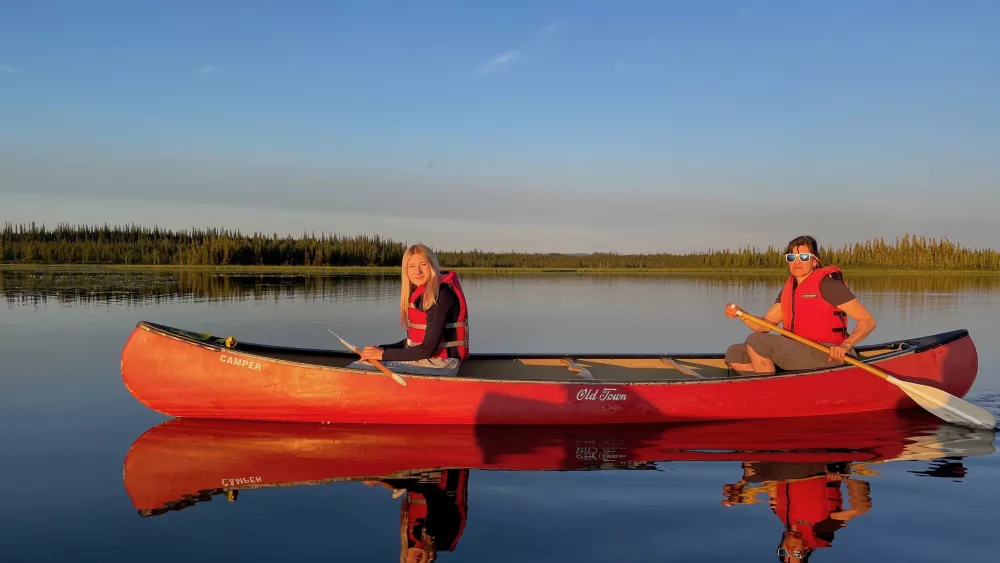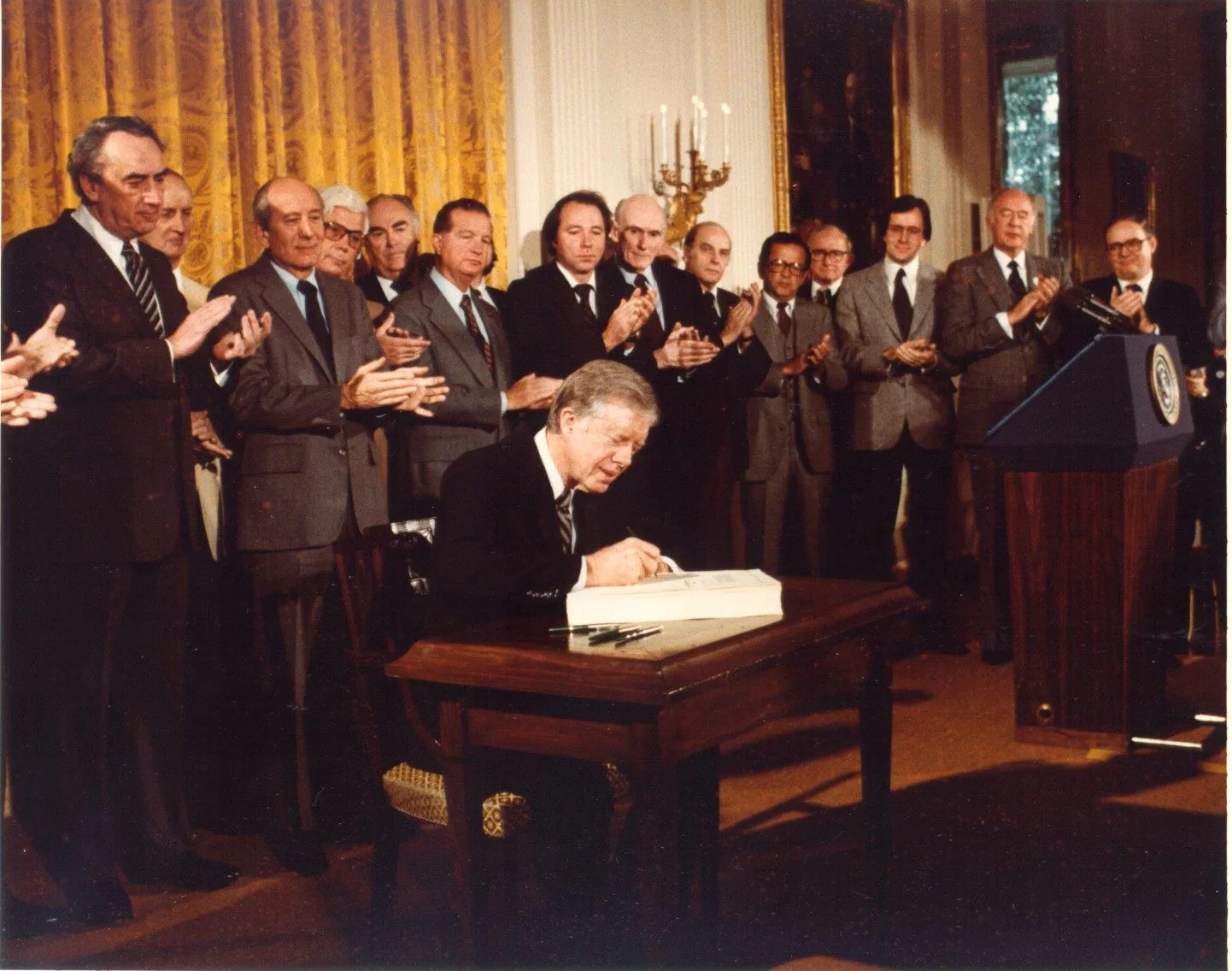 President Jimmy Carter signs the Alaska National Interest Lands Conservation Act on Dec. 2, 1980. Photo courtesy of the Jimmy Carter Presidential Library.
President Jimmy Carter signs the Alaska National Interest Lands Conservation Act on Dec. 2, 1980. Photo courtesy of the Jimmy Carter Presidential Library.
Story by Ned Rozell
Right about now, within a shrub in southern Texas, a ruby-crowned kinglet twitches to face northward.
In a few months, guided by forces neither the kinglet nor human biologists fully understand, the thumb-size songbird will leap into the air and head for Alaska, where it was born. The bird’s ancestors — and billions like them — have flown here each spring for thousands of years.
What’s the appeal of this giant peninsula that juts into the cold ocean?
Alaska — as well as the greater landmass north of the Arctic Circle — is “the world’s bird nursery,” said Natalie Boelman of Columbia University in December 2024. She cited Alaska’s abundance of insects and undisturbed space during her lecture at an immense conference in Washington, D.C.
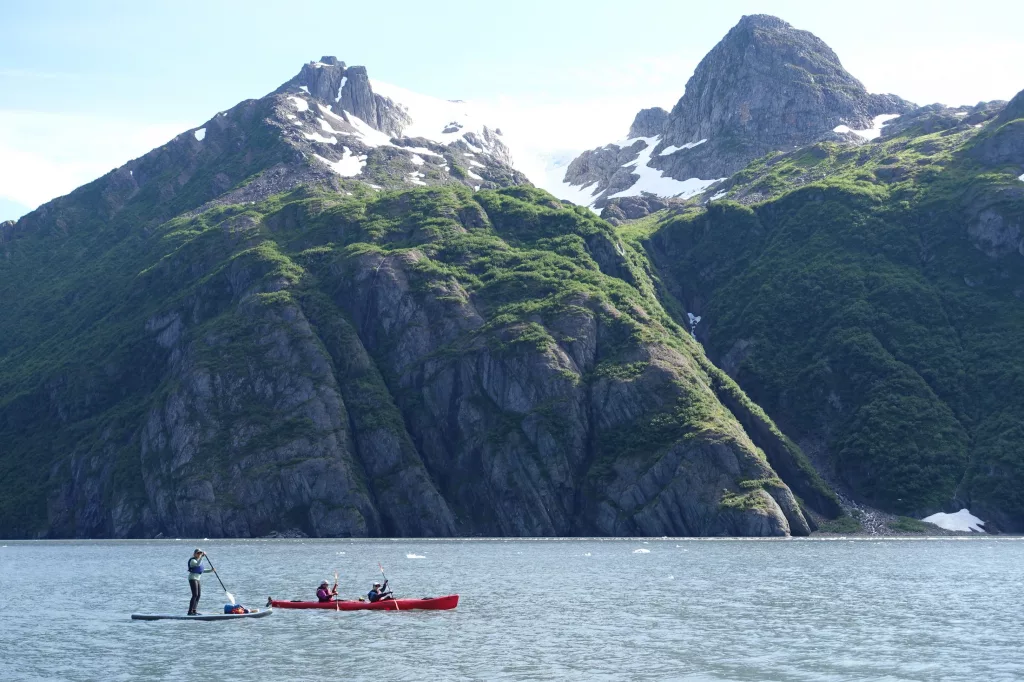 Boaters paddle Kenai Fjords National Park in summer 2024. The park was created in 1980 as part of the Alaska National Interest Lands Conservation Act. Photo by Ned Rozell.
Boaters paddle Kenai Fjords National Park in summer 2024. The park was created in 1980 as part of the Alaska National Interest Lands Conservation Act. Photo by Ned Rozell.
Today, about a month after Boelman’s lecture, is the official national day of mourning for Jimmy Carter, the 39th President of the United States. He died Dec. 29, 2024, at age 100.
When he was 56, in December 1980, Carter signed into law the Alaska National Interest Lands Conservation Act.
Ronald Reagan had walloped Carter in the election a few weeks before. But Carter changed the map of Alaska in a big way on his way out.
One of his final signatures as president made it more likely that in spring 2025 the kinglet can fly from Texas and still land in the Alaska spruce in which its great-great-great grandmother built a nest and laid her eggs.
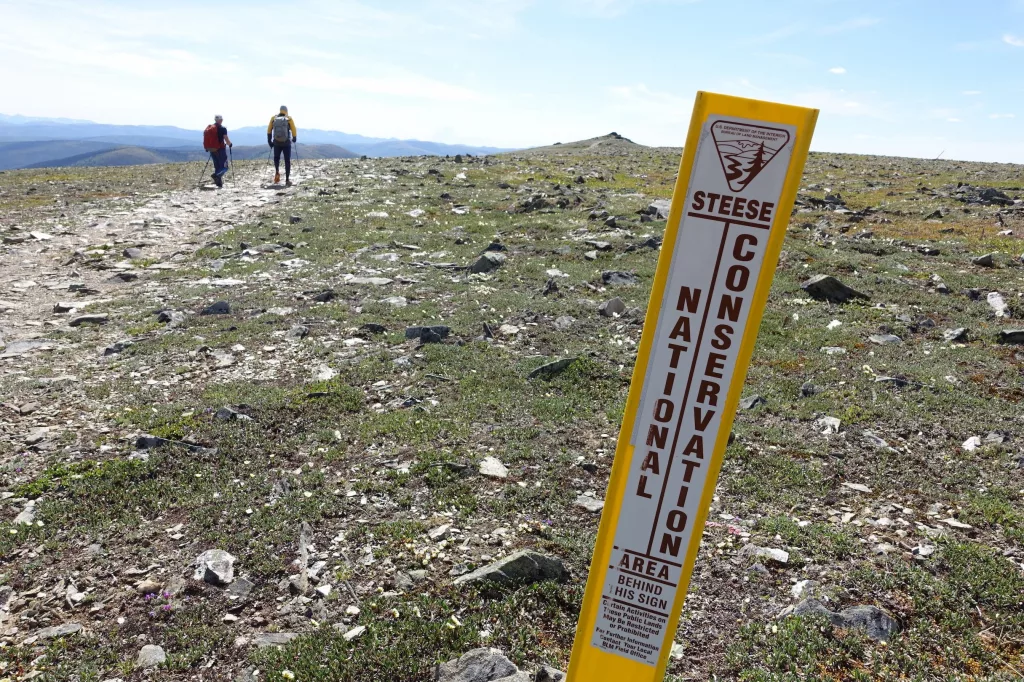 Hikers traverse the Steese National Conservation Area in summer 2024. The conservation area was established in 1980 as part of the Alaska National Interest Lands Conservation Act. Photo by Ned Rozell.
Hikers traverse the Steese National Conservation Area in summer 2024. The conservation area was established in 1980 as part of the Alaska National Interest Lands Conservation Act. Photo by Ned Rozell.
By signing that one act into federal law, Carter ended up protecting almost half of the land area (43 percent) of this giant state, with multiple new national conservation units, including parks, wildlife refuges and monuments.
“In Alaska, we have a unique opportunity to balance the development of our vital resources required for continued economic growth with protection of our natural environment,” Carter said in December 1980 to a reporter for the Washington Post. “We have the imagination and the will as a people to both develop our last great natural frontier and also preserve its priceless beauty for our children and grandchildren.”
This was not one of those last-minute stabs at legacy building. Carter was a fan of Alaska. He had a map of the state tacked up in his office for much of his four-year term. He slept on the ground here. He felt the bend of his fly rod while he stood in Alaska waters.
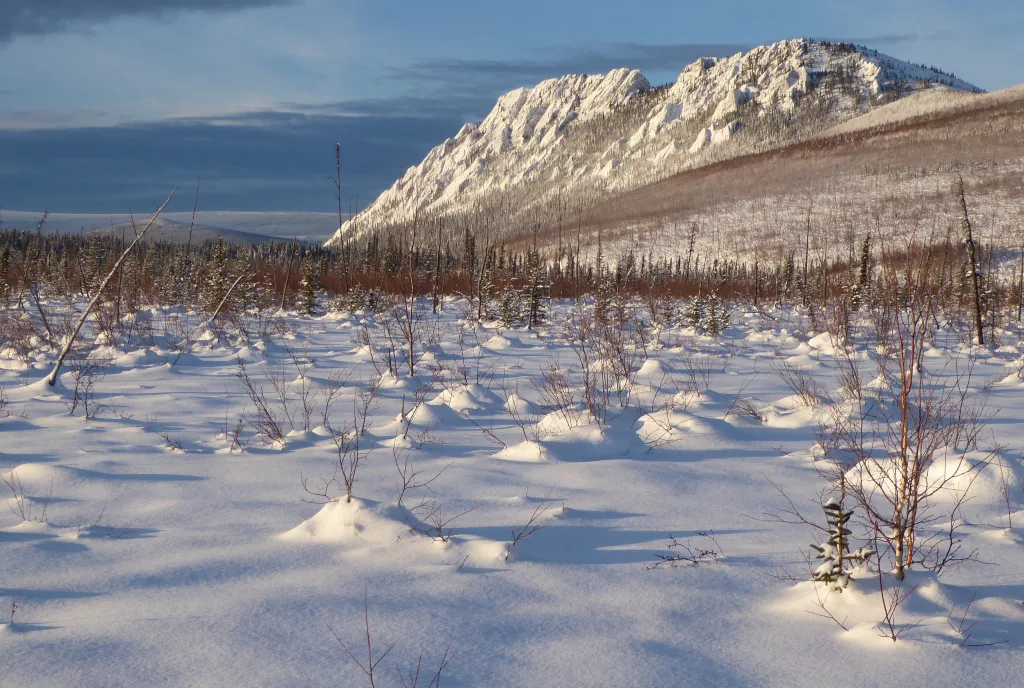 A rock formation rises within the White Mountains National Recreation Area north of Fairbanks. The recreation area was established in 1980 as part of the Alaska National Interest Lands Conservation Act. Photo by Ned Rozell.
A rock formation rises within the White Mountains National Recreation Area north of Fairbanks. The recreation area was established in 1980 as part of the Alaska National Interest Lands Conservation Act. Photo by Ned Rozell.
Carter’s foresight — and the immense work of many professionals who drew up proposals for land worthy of protecting — preceded environmental changes that have since come to roost.
Among them is the loss of almost 3 billion birds from the U.S. and Canada since 1970. And the crash of salmon numbers in Alaska’s largest waterways, to the point where subsistence fishermen are no longer allowed to catch them.
Alaska, however, is still rich in bugs. Unlike in places like Germany, where scientists recently documented a three-quarters reduction in numbers of insects, Alaska still hosts healthy populations. Entomologist Derek Sikes said that Alaska is almost 200 years behind the Lower 48 and the Tropics in regard to habitat degradation.
Just like hungry kinglets, we depend on insects, which pollinate plants that are food sources for us and for other creatures we like to eat. Without them and other nonhuman creatures that share this planet, we are sunk.
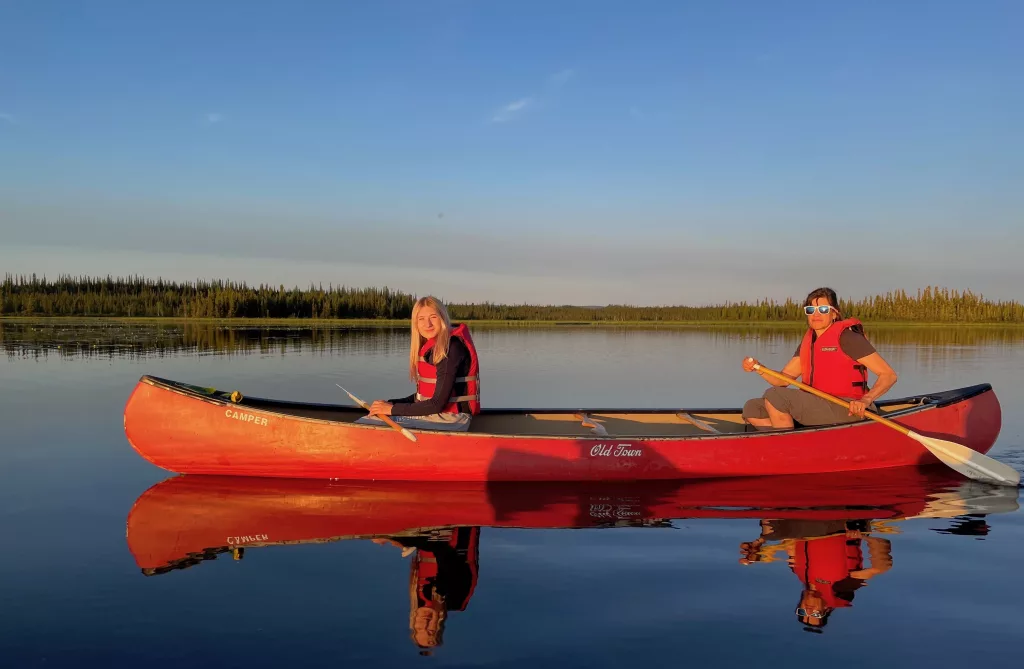 From left, Anna and Kristen Rozell canoe upon Deadman Lake in July 2023. Deadman Lake is part of the 934,513 acres of Tetlin National Wildlife Refuge, established in 1980 as part of the Alaska National Interest Lands Conservation Act. Photo by Ned Rozell.
From left, Anna and Kristen Rozell canoe upon Deadman Lake in July 2023. Deadman Lake is part of the 934,513 acres of Tetlin National Wildlife Refuge, established in 1980 as part of the Alaska National Interest Lands Conservation Act. Photo by Ned Rozell.
So, on behalf of the kinglet and millions of other creatures, a tip of the cap to the man who helped create more than 43 million acres (!) of new national parklands in Alaska. Here is a partial list of those parks and other conservation units that became reality with the Alaska National Interest Lands Conservation Act:
Alaska Maritime National Wildlife Refuge
Alaska Peninsula National Wildlife Refuge
Admiralty Island National Monument
Aniakchak National Monument and Preserve
Arctic National Wildlife Refuge (expanded)
Becharof National Wildlife Refuge
Bering Land Bridge National Preserve
Cape Krusenstern National Monument
Denali National Park (expanded) and Preserve
Gates of the Arctic National Park and Preserve
Glacier Bay National Park (expanded) and Preserve
Iditarod National Historic Trail
Innoko National Wildlife Refuge
Kanuti National Wildlife Refuge
Katmai National Park (expanded) and Preserve
Kenai Fjords National Park
Kobuk Valley National Park
Koyukuk National Wildlife Refuge
Lake Clark National Park and Preserve
Misty Fjords National Monument
Noatak National Preserve
Nowitna National Wildlife Refuge
Selawik National Wildlife Refuge
Steese National Conservation Area
Tetlin National Wildlife Refuge
Togiak National Wildlife Refuge
White Mountains National Recreation Area
Wrangell-St Elias National Park and Preserve
Yukon-Charley Rivers National Preserve
Yukon Delta National Wildlife Refuge
Yukon Flats National Wildlife Refuge




